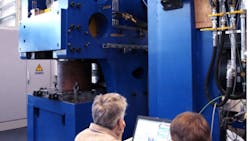SCHULER AG is presenting important recent developments in forging at the EMO trade show in Hanover, Germany, this week -- informing visitors about classic hammer presses, screw presses and hydraulic lines, as well as about novel mechanical presses powered with servo technology.
“We want to establish servo technology for all mechanical lines,” stated managing director Jochen Früh. Depending on the particular application in cold, warm, and hot forging, there are different approaches in which the technology offers considerable benefits.”
The potential is similarly large as for sheet metal forming, where Schuler’s ServoDirect Technology has been able to double productivity in many cases.
“In the case of forging, the part temperature also plays an important role,” explained Jochen Früh, who is responsible for Schuler’s Forging Technology segment. “Cooling and lubrication are time-intensive processes which can now be optimized in the overall process with the transfer and press stroke.” In the case of conventional mechanical presses, these processes were previously predetermined in most cases. The speed of the entire line is governed by the slowest individual process – which is generally the cooling and lubricating of the dies.
Thanks to servo technology, the kinematics of the press slide can now be freely programmed while the machine is running; almost any movement is possible. For example, the servo drive can delay the slide during part transfer to allow the die to cool down more. For the subsequent forming process, it can be accelerated again in order to reduce the pressure contact time. The result: shorter cycle times and greater output performance. The positive effects include a longer die service life and increased part quality.
Also, because the forming speed can be adapted to the material and part geometry, a wide variety of products can be produced on the same line – thus increasing the part spectrum. The servo drive can be used to steer the forming process with precision, to achieve the best-possible material structure. Schuler is working closely with numerous universities on the question of how the forming process can be further improved and optimized with the aid of servo technology.
“As the leading systems supplier, Schuler offers one-stop shopping for its clients,” summarized Jochen Früh. “Our services ranges from part development, method planning and die construction, to the production launch of efficient manufacturing lines and highly skilled after-sales service.”
